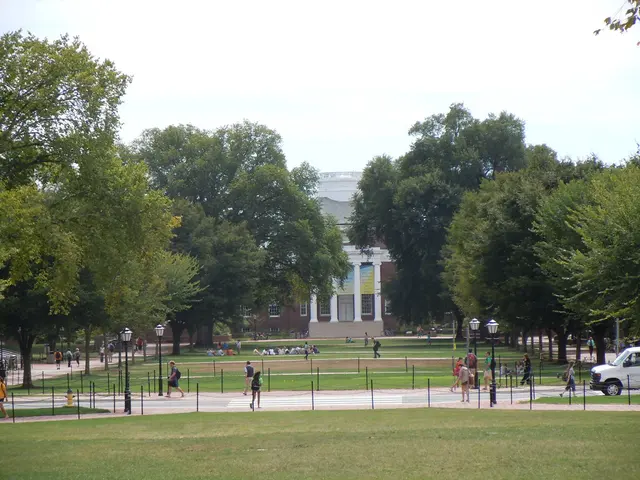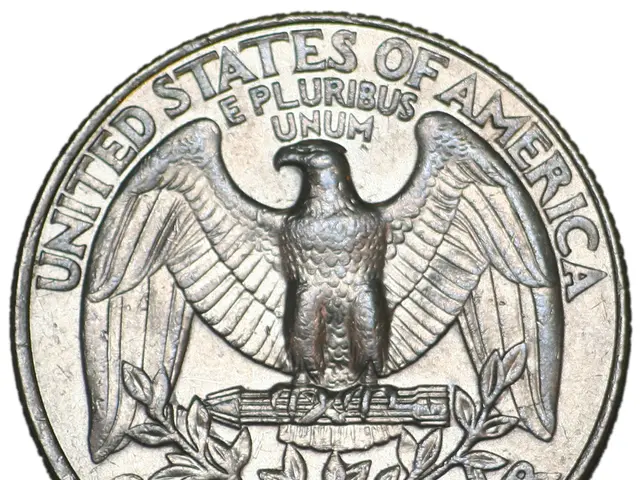China's domestic stance toward Trump's trade war truce reveals skepticism and distrust
Revised and Rewritten Article:
In a surprising move, US President Donald Trump has ignited hope among global investors with his promise to reduce tariffs on Chinese imports. However, Trump's peaceful overture towards China has been met with skepticism and derision within the world's second-biggest economy. Onlookers in China have dubbed Trump as a chicken for backing down after weeks of heated rhetoric.
On Tuesday, Trump addressed reporters at the Oval Office, announcing that the astronomical tariffs on Chinese goods would significantly decrease. He further vowed to steer clear of hardball tactics and pledged to adopt a friendly approach at the negotiating table. Interestingly, Trump also promised not to revisit the origins of the Covid-19 pandemic during the talks.
However, Beijing seems unmoved by Trump's olive branch. A spokesperson for China's Foreign Ministry, speaking on the matter, echoed a familiar refrain: Beijing is open to discussions, but only when there's no pressure or threat of triple-digit tariffs looming.
Chinese advisors perceive Trump's peace offering as a tactical retreat fueled by domestic pressure and an attempt to pacify the markets. They believe that China is in the driver's seat and has no immediate need to strike a deal with Trump.
Wang Yiwei, the director of the Institute of International Affairs at Renmin University in Beijing, explained to CNN that the mistrust within Chinese officials towards Trump is palpable, given the weeks of mixed messages and posturing.
"The pressure at home is escalating. Trump's current messaging is centered on easing domestic concerns, such as the slump on Wall Street and inflation. However, China is unwilling to be swayed by his talk about cutting tariffs. He's known for his conflicting statements – one day saying one thing, and another something entirely different," said Wang.
Wu Xinbo, the director of the Center for American Studies at Fudan University in Shanghai, concurs. According to Wu, China is "in no rush" to engage in talks and is well-prepared to endure economic pressure.
"Instead of accepting offers to talk too soon, it might be more beneficial to weather a bit of conflict first – doing so could make negotiations smoother and lead to more favorable outcomes for China," says Wu. "We can afford to delay negotiations for a little while longer."
China has been projecting strength for months. Last week, Chinese leader Xi Jinping embarked on a tour of Southeast Asia to bolster China's reputation as a reliable political and economic partner. Nevertheless, the Chinese economy is no longer the unstoppable force it once was, and some experts believe Beijing will eventually have to come to the negotiating table.
Trump's potential change of heart on China came a day after he met privately with the CEOs of four major US retail companies – Walmart, Target, Home Depot, and Lowe's – who expressed concerns about the economic fallout from Trump's tariff policy and the uncertainty it creates for financial markets.
Investment banks have predicted that the massive tariffs, along with China's retaliatory tariffs on US goods, could send the US and global economies into a recession.

On Wednesday, Trump confirmed to reporters that there are continuous talks between US and Chinese officials "every day" on trade, albeit without providing specific details. And while the president hasn't specified the exact percentage of tariff reduction, a senior White House official told the Wall Street Journal that the current 145% tariffs could potentially drop to "between roughly 50% and 65%."
However, Renmin University's Wang stated that slashing tariffs to that extent isn't sufficient to incentivize China to negotiate.
"If you truly want to engage in serious negotiations with China, then you need to abandon all those baseless tariffs first and then return to the table," said Wang. "Trump is trying to lure China into negotiations."
Wu, the expert in Shanghai, stressed that any trade talks must be held under China's conditions.
"From China's standpoint, I'd sum it up like this: The trade war was triggered by the U.S., but whether to negotiate is up to China – timing and content will be determined by China," said Wu.
While the news that the Trump administration is considering lowering the tariffs was largely dismissed on Chinese social media, the hashtag "Trump chickened out" was trending on the platform Weibo, gathering more than 150 million views. One user wrote in a comment that garners over 1,000 likes, "Our side doesn't care about that!" Another commented, "If the so-called reciprocal tariffs aren't even lifted – forget about negotiating with them!"
Censorship of opposing views
Officially, Beijing maintains a hardline stance on opposing views – as evidenced by the censorship of dissenting opinions on Chinese social media regarding tariffs with the US. However, an anonymous foreign policy expert speaking to CNN expressed concerns about the impact of the sky-high tariffs on China's sluggish economy.
"Chinese authorities are not telling the truth. The economic decline is torturing us," they confided. If the 145% tariffs remain, "our entire foreign trade landscape would be severely affected, resulting in widespread unemployment, social unrest, and potential ramifications for government legitimacy," the expert warned.
Similar criticisms of China's move to impose retaliatory tariffs on the US, as well as criticisms of Beijing's handling of the trade war, are frequently censored on Chinese social media.
- The reduction of tariffs on Chinese imports by President Trump has been met with skepticism in China, with some dubbing him a 'chicken' for backing down after weeks of heated rhetoric.
- Chinese advisors see Trump's peace offering as a tactical retreat fueled by domestic pressure and an attempt to pacify the markets, believing that China is in the driver's seat and has no immediate need to strike a deal with Trump.
- Wang Yiwei, a director at Renmin University in Beijing, stated that the mistrust within Chinese officials towards Trump is palpable, given the weeks of mixed messages and posturing.
- Wu Xinbo, a director at Fudan University in Shanghai, concurs that China is "in no rush" to engage in talks and is well-prepared to endure economic pressure.
- An anonymous foreign policy expert speaking to CNN expressed concerns about the impact of the sky-high tariffs on China's sluggish economy, warning that if the 145% tariffs remain, "our entire foreign trade landscape would be severely affected, resulting in widespread unemployment, social unrest, and potential ramifications for government legitimacy."
- Criticisms of China's move to impose retaliatory tariffs on the US, as well as criticisms of Beijing's handling of the trade war, are frequently censored on Chinese social media.





